| Srl | Item |
| 1 |
ID:
090494


|
|
|
| 2 |
ID:
122623
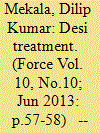

|
|
|
| 3 |
ID:
137584
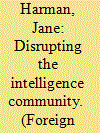

|
|
|
|
|
| Summary/Abstract |
Some 40 years have passed since the Church Committee’s sweeping investigation of U.S. intelligence practices, fresh on the heels of the Watergate scandal. And ten years have gone by since the last major reorganization of the country’s spy agencies, enacted in the wake of 9/11. Both efforts led to a host of reforms—among them, the creation of the Senate and House Intelligence Committees, the passage of the Foreign Intelligence Surveillance Act (FISA), and the adoption of the Intelligence Reform and Terrorism Prevention Act, which I helped shepherd through Congress.
|
|
|
|
|
|
|
|
|
|
|
|
|
|
|
|
| 4 |
ID:
163803
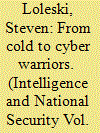

|
|
|
|
|
| Summary/Abstract |
How did the National Security Agency (NSA) adopt the practice of
hacking? This paper explores how NSA confronted the digital age by
focusing on arguably NSA’s key organizational innovation as a microcosm of these broader changes: the Office of Tailored Access Operations
(TAO). This paper develops a pragmatist model of organizational change
showing how the practice of hacking became a practical solution to deal
with the problems posed by a globally networked world through TAO’s
case history. TAO’s aggressive expansion by developing a scalable
Computer Network Exploitation (CNE) architecture was designed to
keep NSA relevant in the twenty-first century
|
|
|
|
|
|
|
|
|
|
|
|
|
|
|
|
| 5 |
ID:
102984
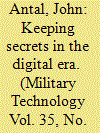

|
|
|
| 6 |
ID:
130571
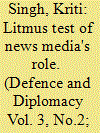

|
|
|
| 7 |
ID:
122919


|
|
|
|
|
| Publication |
2013.
|
| Summary/Abstract |
Intelligence analysts spend a good deal of time discussing accuracy in forecasting and they should. Saying accurate things about the future is arguably much more valuable to decisionmakers than saying accurate things about the present or past. Doing so is also inherently more difficult.
Even when trying to say accurate things about the future, though, some questions are easier for analysts to answer than others. Why? What are the essential elements of a question that make it obviously more or less difficult to answer? How can these criteria be generalized across all questions?
Intelligence professionals are not the only ones to recognize the inherent difficulties in different kinds of questions. Michael V. Hayden, the former Director of both the Central Intelligence Agency (CIA) and the National Security Agency (NSA), delights in telling this story:
Some months ago, I met with a small group of investment bankers and one of them asked me, "On a scale of 1 to 10, how good is our intelligence today?" I said the first thing to understand is that anything above 7 isn't on our scale. If we're at 8, 9, or 10, we're not in the realm of intelligence-no one is asking us the questions that can yield such confidence. We only get the hard sliders on the corner of the plate. 1
|
|
|
|
|
|
|
|
|
|
|
|
|
|
|
|
| 8 |
ID:
158603


|
|
|
| 9 |
ID:
134424
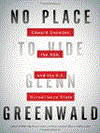

|
|
|
|
|
| Publication |
New York, Metropolitan Books, 2014.
|
| Description |
259p.Hbk
|
| Standard Number |
9781627790734
|
|
|
|
|
|
|
|
|
|
|
|
Copies: C:1/I:0,R:0,Q:0
Circulation
| Accession# | Call# | Current Location | Status | Policy | Location |
| 057924 | 323.44820973/GRE 057924 | Main | On Shelf | General | |
|
|
|
|
| 10 |
ID:
132535
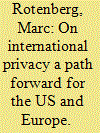

|
|
|
|
|
| Publication |
2014.
|
| Summary/Abstract |
The United States and its closest allies may be on a collision course over the future of privacy in the networked world. Whether leaders are able to find a policy solution will require that they understand the significance of the recent NSA disclosure as well as the development of modern privacy law. Long before a former NSA contractor spilled the secrets about the scope of the NSA's global surveillance, foreign governments worried about the ability of the United States to monitor those living in their countries. The increasing automation of personal information and the technological advantage that the United States enjoyed over other nations was already seen as a problem in the late 1960s. The concerns only increased as Internet-based commerce gave rise to the vast collection and storage
|
|
|
|
|
|
|
|
|
|
|
|
|
|
|
|
| 11 |
ID:
129939


|
|
|
| 12 |
ID:
076354
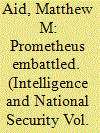

|
|
|
|
|
| Publication |
2006.
|
| Summary/Abstract |
Five years after the tragic events of September 11, 2001, the National Security Agency (NSA) has risen to the position of being the largest and most powerful intelligence agency in the US. Working in close conjunction with its English-speaking partners overseas, NSA is today the most prolific producer of top-quality intelligence information reaching senior US government policymakers and field commanders. But press reports over the past year concerning the Agency's controversial domestic eavesdropping program and problem-plagued modernization effort, have raised serious questions once again about the competency of the Agency's long-troubled management practices, as well as whether NSA, at the behest of the Bush administration, exceeded its legal authority by extending its operations into the US for the first time since the mid-1970s in contravention of the Foreign Intelligence Surveillance Act (FISA) of 1978.
|
|
|
|
|
|
|
|
|
|
|
|
|
|
|
|
| 13 |
ID:
128829


|
|
|
|
|
| Publication |
2013-14.
|
| Summary/Abstract |
Recent debate about the organizational relationship between cyber command and the NSA stress political issues over force employment. This article focuses on the latter, making the case that cyber command should be split from the NSA, because nations that marshal and molilize their cyber power and integrate it into strategy and doctrine will ensure significant national security advantage. Cyber command provides the best route for developing the tactics, technique, and procedures necessary for achieving these goals.
|
|
|
|
|
|
|
|
|
|
|
|
|
|
|
|
| 14 |
ID:
096329


|
|
|
| 15 |
ID:
091239
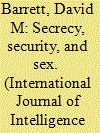

|
|
|
|
|
| Publication |
2009.
|
| Summary/Abstract |
Congressional monitoring of intelligence activities has always been somewhat controversial, but its roots go back to the founding era of the United States, when the new Constitution gave both the President and Congress important roles in foreign affairs.
|
|
|
|
|
|
|
|
|
|
|
|
|
|
|
|
| 16 |
ID:
122283
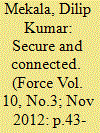

|
|
|
| 17 |
ID:
132440


|
|
|
| 18 |
ID:
148921
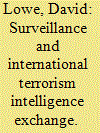

|
|
|
|
|
| Summary/Abstract |
Using the revelations Edward Snowden passed over to the press regarding the actions of the U.S.’s National Security Agency and the UK’s Government Communications Headquarters and their use of the Prism project, this article examines the law surrounding intelligence gathering in the U.S. and UK. Underpinning the analysis is the legal principle of proportionality as applied to balancing the interests of national security and individual liberties. After examining intelligence exchange procedures, which for the UK is through negotiated agreements between national security agencies and through the European Union’s policing agency, Europol, the main part of the article discusses legal challenges that have been made regarding surveillance and the use of anti-terror laws on citizens and the rationale behind the judicial decisions made in both the U.S. and UK jurisdictions. The argument forwarded is that there is a requirement for wide preventative powers being granted to counter-terrorism agencies and that the interests of national security and individual liberty are inclusive and, as shown by the cases covered in this article, we should rely on the judiciary to perform their function in applying proportionality to each case on its own merits.
|
|
|
|
|
|
|
|
|
|
|
|
|
|
|
|
| 19 |
ID:
021039
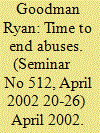

|
|
|
|
|
| Publication |
April 2002.
|
| Description |
20-26
|
|
|
|
|
|
|
|
|
|
|
|
|
|
|
|
| 20 |
ID:
149875
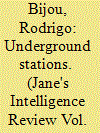

|
|
|
|
|
| Summary/Abstract |
The high public profile of the theoretically anonymous Tor network has made it a key target for law enforcement. As Tor-related arrests and takedowns multiply, Rodrigo Bijou examines how other privacy platforms and networks may come to take its place.
|
|
|
|
|
|
|
|
|
|
|
|
|
|
|
|